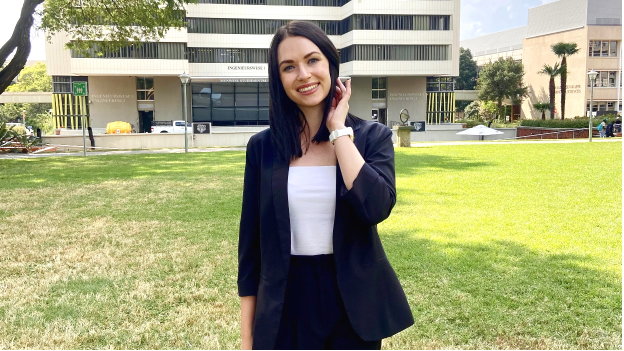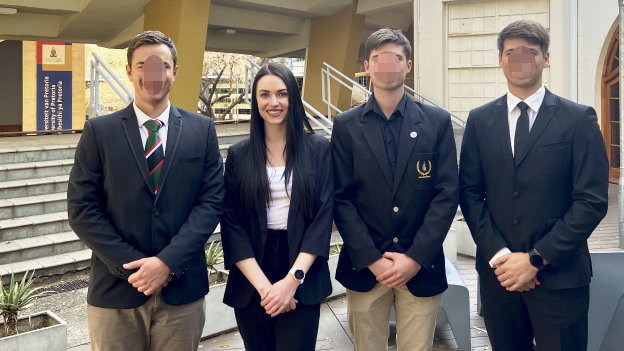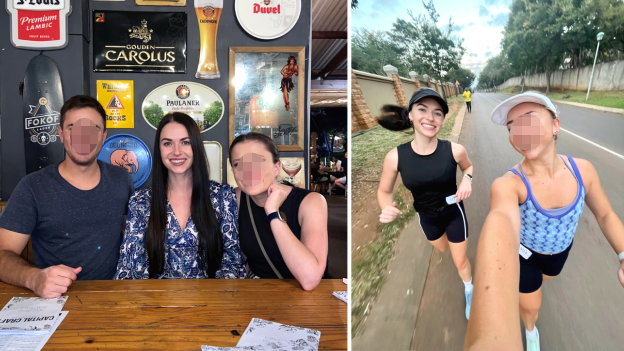Nikha Harris
 Privat
Privat
Nikha harris in front of the engineering builduing
“Receiving the Helmut & Babs Amos Scholarship from the DAAD-Stiftung was both a privilege and an honour. This scholarship paved the way for me to pursue and complete my Master's degree in mechanical engineering, equipping me with the essential knowledge and skills crucial for launching a successful career journey.”
As part of the Helmut & Babs Amos Scholarship, Nikha Harris investigated the heat transfer and pressure drop behavior of laminar flow through rectangular ducts. Her work, which is based on numerical analysis (CFD), aims to improve the energy efficiency of heating and cooling systems.
In the following, she reports on her findings:
My area of study focused on developing forced and mixed convective flow in rectangular channels heated at a uniform heat flux. The research was Computational Fluid Dynamics (CFD)-based, and simulations were conducted using Ansys-Fluent. CFD is an important tool in engineering, allowing us to model real-life problems in a virtual space and use numerical methods to solve them.
This approach enables the resolution of complex problems that are difficult to test experimentally or would incur significant costs if an experimental setup were required. I gained proficiency in working seamlessly with CFD software (Ansys-Fluent) and running simulations on the CHPC supercomputer in South Africa, located in Cape Town.
My master's thesis comprised a literature review, validation, mesh independence study, model setup, results, conclusions, and recommendations. In this study, I investigated water flow through micro rectangular channels with varying aspect ratios (1/2, 1, and 2).

Privat
Graduates posing proudly on campus on postgraduate photo day
Each channel experienced a constant heat input as boundary conditions. Different heat input values and Reynolds numbers were tested to analyze their impact. The findings revealed that flow in these microchannels exhibited secondary flow (vortices) due to both heat input and gravity effects (mixed convection). Reported results included Nusselt numbers, vortex core locations, and circulation strength. One notable discovery was that channels with smaller aspect ratios exhibited higher heat transfer rates and stronger circulation induced by gravity.
The conclusions drawn from the results indicate that as the aspect ratio of the rectangular channel decreases, the Nusselt number increases. Moreover, the circulation strength of the flow was found to be directly proportional to the Nusselt number, with smaller aspect ratios yielding higher circulation strength.
The study also revealed that higher heat input and lower Reynolds numbers led to increased Nusselt numbers and circulation strength. Under specific conditions of heat input, Reynolds number, and aspect ratio, a second vortex pair could form, resulting in a double vortex pair, which enhances heat transfer. Such phenomena can be observed in a counter-flow printed circuit heat exchanger with micro rectangular channels under mixed convection conditions.

Privat
From "mental exercise" to physical sport: Fun at quiz night and an energizing run
A recommendation was made to collect more data points to determine the transition point from a single counter-rotating vortex pair to a double vortex pair. The study underscored the significance of mixed convection, emphasizing that aspect ratio cannot be ignored in heat transfer calculations, given the notable differences in results for various aspect ratios. Additionally, a multi-channel setup was tested, and the study concluded that the results obtained for a single channel could predict results in a counter-flow printed circuit heat exchanger with good accuracy. I completed my master's dissertation in December 2023.
Being the recipient of the Helmut & Babs Amos Scholarship is truly an honor. This scholarship has empowered me to further my studies, for which I am profoundly grateful. The additional knowledge and skills I acquired during my master’s degree are invaluable and will undoubtedly enhance my development as an engineer. I have significantly improved my coding and analytical abilities, as well as my communication and interpersonal skills.
On a personal level, this scholarship has not only enabled me to advance my studies, but has also afforded me the opportunity to connect with like-minded individuals at the University of Pretoria who were also pursuing further education.
Additionally, the DAAD-Stiftung Scholarship has provided me with the freedom to engage in extracurricular activities during my spare time, as it alleviated financial constraints and eliminated the need for a part-time job. As a result, I was able to join a weekly running club and participate in quiz nights as well as enrich my university experiences.
This experience would not have been possible without the DAAD-Stiftung's Scholarship and the pursuit of a Master’s degree. It has enriched both my academic and personal journey. Moreover, it has afforded me the opportunity to conduct research in the field of heat transfer/thermo, a subject I am deeply passionate about.
I am forever grateful for this opportunity, which has expanded my knowledge and broadened my engineering network.
Next, I intend to explore which segments of the collected data and the current topic can be expanded upon in later stages. Additionally, I am excited about applying the knowledge and skills acquired in the working world, and I am eager to start my career as a software engineer.
As of January 2024.


